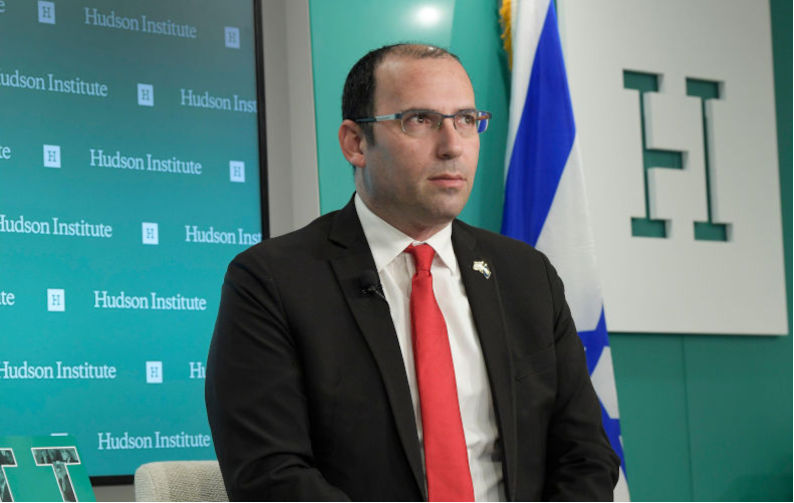Cancelling the ethnic cleansers: Australia revokes Simcha Rothman’s visa
August 22, 2025
It is a curious feeling to see a government, let alone any politician, suddenly find their banished backbones and retired principles.
The spine, on being discovered, adds a certain structural integrity to arguments otherwise lacking force and credibility. The recent spat between Israel and Australia suggests that Prime Minister Anthony Albanese’s often insecure, and often overly cautious, administration is starting to show some muscle and certitude.
The cancellation of Simcha Rothman’s visa by the Albanese Government was something of a minor revelation. Rothman is a member of Mafdal-Religious Zionism, a party led by Finance Minister Bezalel Smotrich that has made its position on Palestinians unmistakably clear. (Smotrich became the subject of sanctions by Australia along with Canada, New Zealand, Norway and the United Kingdom in June for “inciting violence against Palestinians in the West Bank".) As a certain garden variety shrub of hate, he decries countries for not taking in Palestinians as part of an approved ethnic cleansing program, accusing them of “aiding and abetting a terrorist organisation using them as human shields”. In an interview with Australia’s national broadcaster, Rothman made his primary colour position clear: “I think the government of Australia needs to decide, do they want to be on the side of Hamas, or do they want to be on the side of Israel?”
The letter of revocation stated that he would be engaged in events that would “promote his controversial views and ideologies, which may lead to fostering division in the community”. Being in Australia “would or might be a risk to the good order of the Australian community or a segment of the Australian community, namely, the Islamic population”.
Adduced examples of demerit included arguments that Palestinian children were not perishing to hunger in the Gaza Strip, that those children, in any case, were enemies of the Israeli state, along with the notion that the two-state solution had “poisoned the minds of the entire world”. The nature of such “inflammatory statements” might, were Rothman to enter Australia licensed by the government, “encourage others to feel emboldened to voice any anti-Islamic sentiments, if not to take action to give effect to that prejudice”.
Far from engaging these reasons, Rothman’s enchantingly, shrunken worldview was clear in its chiselled simplicity: Australia was behaving undemocratically, its government falsely claiming to argue against “hate and division” despite permitting protesters “to shout on the streets calls for genocide of the Jewish people".
Israel’s Foreign Minister Gideon Sa’ar was quick in response, revoking the residency visas of Australia’s diplomatic representatives responsible for affairs concerning the Palestinian Authority in Ramallah. “I also instructed the Israeli Embassy in Canberra to carefully examine any official Australian visa application for entry to Israel,” Sa’ar fumed on X.
In this apoplectic reaction, no-one seemed to recall that Australia had already revoked the visa of a former Israeli justice minister, Ayelet Shaked, at the end of October last year over what Australia’s Home Minister Tony Burke described as “concerns she would threaten social cohesion”. Shaked had been slated to attend events organised by the Australia Israel & Jewish Affairs Council. Admittedly, she was a former politician rather than a sitting member of the Israeli parliament.
In an interview with the Erin Molan Show, an otherwise underwhelming program, Sa’ar recapitulated his cranky position. “This is the opposite of what should be done,” he objected. “Instead of battling antisemitism in Australia, the Australian government is doing the opposite – they are fuelling it.”
The Palestinian Authority surprised nobody in calling the measure to cancel visas “illegal and in violation of the Geneva Conventions, international law, the United Nations resolutions, which do not grant the occupying power such authority". The statement went on to stress “that such actions reflect Israeli arrogance and a state of political imbalance, and will only strengthen Australia’s and other countries’ determination to uphold international law, the two-state solution, and recognition of the State of Palestine as the path to peace".
Australia’s foreign minister, Penny Wong, also thought this all a bit much. Calling the decision to cancel the visas of Australia’s diplomats in the West Bank an “unjustified reaction” to Canberra’s decision to recognise Palestine, Wong felt confident enough to retort that the Israeli decision had been foolish. “At a time when dialogue and diplomacy are needed more than ever, the Netanyahu Government is isolating Israel and undermining international efforts towards peace and a two-state solution.”
This messiness was appropriately crowned by that grand figure of demagoguery himself, the Israeli prime minister. “History will remember Albanese for what he is: A weak politician who betrayed Israel and abandoned Australia’s Jews,” came the scornful blast from the office of Benjamin Netanyahu. The Israeli prime minister is certainly not wrong about Albanese being weak, but mistaken about what he has been weak about. Most intriguing, Albanese has found some courage on this front, albeit the sort of courage fortified by allies. But that’s something.
Republished from CounterPunch, 20 August 2025
The views expressed in this article may or may not reflect those of Pearls and Irritations.


